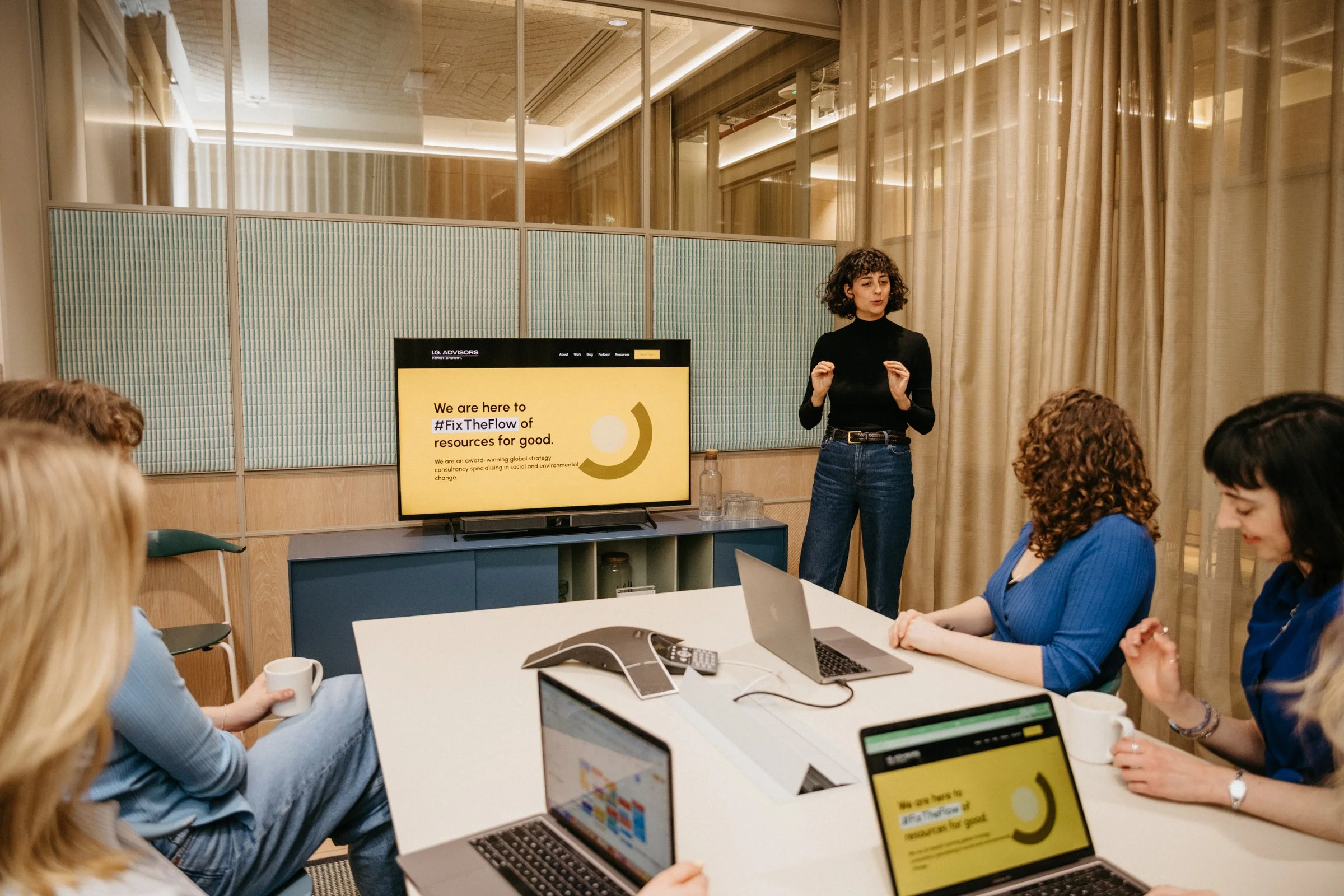Five proposal writing tips — straight from the donor’s mouth

Proposal writing is an alchemy of art and science, requiring endurance, attention to detail and expert storytelling finesse. Securing a major gift fundamentally comes down to relationship building — but if you don’t have the writing to back this up, you remain at the bottom of the pile.
So how can fundraisers stand out in a written context? Here are five tips straight from donors themselves, as heard on I.G. Advisors’ podcast, What Donors Want.
#1: Don’t try to make the shoe fit (when it’s clearly never going to fit)
“The first variable to determine whether a grant is effective is strategic alignment,” (Alfonsina Peñaloza, Hewlett Foundation), so you must “read that you’re eligible before going through the [proposal] process,” (Adam Askew, Comic Relief).
Foundations typically score proposals with pre-set criteria so there is no disguising of square pegs in round holes. Donors can always tell when you’ve manipulated your mission to align with their funding priorities, and it comes off as inauthentic and frustrating.
#2: Make information easily digestible
Behind the scenes at foundations, proposals are typically read first by junior staff members who shortlist piles and summarise these to senior decision-makers. To get past this first gate, you need to communicate simply and specifically, and “[have key information jump off the page]. It makes life as an assessor and as an application reader much more straightforward,” (Adam Askew, Comic Relief).
Think about that junior staff member summarising your proposal, and make sure they can do this easily during an afternoon sugar crash.
#3 Frame prospects as partners — not donors
“The healthy way to have a relationship with a programme officer is to see them as much as possible as a partner rather than a donor,” (Alfonsina Peñaloza, Hewlett Foundation). This is particularly true of major donors who require highly bespoke cultivation and messaging, and “get a buzz [from] the involvement,” (Lynne Smitham, Kiawah Trust).
This partnership approach must be reflected in your proposals through language that makes donors feel their value transcends cash. Be sure to use phrases like in partnership, and always use the word support instead of funding or contribution.
#4 Tell brilliant stories
Good storytelling is essential to effective proposal writing (in fact, the terms are close to a euphemism). In contrast to procurement processes, “[private philanthropic donors want to be] inspired and want [you to tell them] a compelling and brilliant story,” (Adam Askew, Comic Relief).
This is also a fantastic opportunity to centre the perspectives of your beneficiaries in your proposal, and demonstrate how you include them as valued stakeholders in your work.
#5 Let your personality shine
I’ve now officially outed myself as a North American, but “passion for issues is not to be undermined,” (Alfonsina Peñaloza, Hewlett Foundation). Your proposal must have personality and give the donor a sense of the people behind the mission they are investing in. “[You need to demonstrate] passion, energy, focus and competence,” (Lynne Smitham, Kiawah Trust), and avoid jargon and technical phrases that feel dry and uninspiring. Remember, people ultimately — and always — give to people.
During our interview in Episode 3, Adam Askew (Comic Relief) lamented on the frustration of knowing a charity is brilliant but not being able to convince ultimate decision-makers of this brilliance because it doesn’t translate on paper.
You heard it from the donor first — strong written communication is utterly essential. Don’t let this stop you from securing the funding you need.
For more proposal writing and cultivation tips, subscribe to What Donors Want on iTunes (and hear them straight from the donor’s mouth).
This post was written by Rachel Stephenson Sheff from I.G. Advisors — a London-based, social impact strategy and management consultancy specialising in philanthropy, corporate impact and fundraising advice. Rachel is also the producer of What Donors Want.
Originally published at www.charitydigitalnews.co.uk on January 16, 2018.
I find ‘We don’t have time for strategy right now’ is almost always said by people who are already living with the consequences of not having one.
To help you understand the breadth of things our brilliant team can do, I’ve put together this summary of our 2025 work (that we’re allowed to talk about publicly), with links to some of the brilliant clients we supported and partnered with across the world last year.
2026 can be the year European philanthropy chooses courage over fear. After a challenging 2025, the sector has a chance to step boldly into its enormous potential. In this piece, our Advisor Carli shares three ways to strengthen philanthropy - through strategic fundraising, cross-border learning, and investing in community - so Europe’s social impact can thrive despite uncertainty.
Late last year, a few of us in the Collective Leadership Group began exploring how GenAI could support leadership and development in the social impact space.
We found it could grasp the unique challenges social leaders face and uncover relevant learning resources we hadn’t seen before. Its potential to empower underrepresented and underserved changemakers quickly became clear…
Institutions don’t drive change. People do. People are the idea generators, project implementers, and system shakers. Yet, while we often talk about the importance of investing in organisations, we rarely think about investing in the people who lead them.
Since March 2022, I.G. Advisors has worked closely with Kurt Geiger to design and implement Business by Design—a fully-funded, AQA-accredited programme co-created with young people to drive access, opportunity, and equity in the creative industries. This isn’t a side initiative—it’s embedded in how the business operates.
As we close the chapter on 2024 and step into a new year, our Advisor, Harriette, finds herself reflecting on what’s needed to move philanthropy forward in 2025.
It’s not a groundbreaking revelation that staff wellbeing and burnout are huge challenges our sector is facing right now, and the sector-wide lack of investment in professional development has a lot to answer for.
Our Associate Advisor Charly makes the case that greater investment in your grantmaking team = greater impact for your organisation, and beyond.
While philanthropy and football may seem worlds apart, I’ve started thinking about the many similarities that can provide valuable lessons for those in the philanthropic sector. I for one, am always learning about the essential elements of football that can inspire and inform effective philanthropy.
Through the power of collective design, our fundraiser and grantmaker #FixTheFlow Fellows have imagined the future of our philanthropic funding system, and we should all listen carefully.
In the coming months, our Associate Carli is exploring the complexities of social innovation and will share her learnings, insights, and questions with you.
I.G.’s CEO Emily shares some of the mistakes and challenges she found during her leadership journey, and what she learned and will share in I.G.’s new Leadership Lab.
I’m expected to show up as a leader, but don’t feel like a leader. Introducing Impact & Grow: A Leadership Lab.
Leveraging Limited Funds For Humanitarians: Insights from the 2024 #HX24 conference, organised by Save the Children UK and the Humanitarian Leadership Academy.
Social enterprises have a particularly interesting relationship with Monitoring, Evaluation and Learning (MEL) as they need to capture both the financial and social/ environmental impact of their work, and speak to a wide range of potential funders and investors. Caitlin McLoughlin chatted to Abhinav Khanal, Co-Founder and Executive Director of Bean Voyage, to explore this further.
Image Credit: Bean Voyage
A round up of everything the I.G. team did in 2023!
Introducing a new, dedicated funders stream to I.G.’s #FixTheFlow Fellowship! We’re accepting applications until 17th November (for a 2024 start). Join our movement at fixtheflow.org
Join us for one (or all!) our eight workshops in our Autumn Training Series, where we will cover some of the trickiest topics facing fundraisers today.
What does meaningful and effective learning actually mean in practice?
Our Advisor Caitlin interviews Kore Global’s Emily Boost on learning how to learn and all things feminist evaluation and learning.
How do we balance our passion and our desire to give our best, whilst not being consumed by failure to live up to our own or others’ expectations?
At I.G. Advisors (I.G.), we’re often approached to design and implement evaluations for our clients to understand the impact of their grantmaking, fundraising or programmatic strategies, and identify opportunities for evolution.
The ‘lone saviour’ approach won’t cut it (and it also might destroy you).
It’s hard to believe it now that we’re living through a polycrisis, but the financial crisis and Great Recession of the 00s felt like a once-in-a-lifetime jolt to the world order at the time.
What you can learn from others leading philanthropic networks like yours
‘Well, we could have called that one.’
I.G. Advisors (I.G.) recently had the pleasure of collaborating with The Big Give and Rosa on the Women and Girls Match Fund.
Senior Social Impact Advisor (I.G. Advisors & Lightful)






























